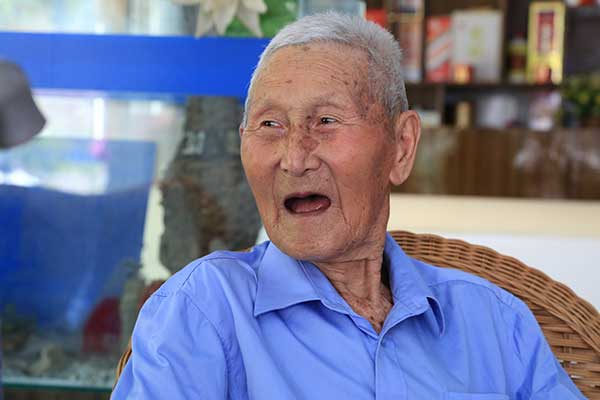Travelers of a hard road
 |
|
Long March veteran Meng Shaojin, 95, during the interview in Yinjiang county, Guizhou province.[Photo By Yang Jun and Satarupa Bhattacharjya /China Daily] |
Nearly eight decades since the Long March ended, only a handful of the survivors are still alive. Satarupa Bhattacharjya interviews two veterans in Tongren
Huang Jianjun has been staying at Tongren City People's Hospital for the past four years owing to high blood pressure and ailments related to his heart and lungs.
He was in his early teens in 1934, when a column of Communist troops was passing through his hometown in North China's Shanxi province as part of the Long March, which was a strategic retreat over 24 months undertaken by the Red Army since that year to avoid being captured by then-ruling nationalist Kuomintang forces.
The Red Army, the forerunner of the People's Liberation Army, lost thousands of its men and women during the march from the country's south to the north and west. A large number of civilians who followed the soldiers were also killed by the KMT and war-lords, according to historians.
Tongren is a prefecture-level city in Guizhou province, in the country's southwest, where Huang has lived since retiring as a PLA surgeon in 1957.
Less than 15 such veterans are alive in Guizhou, local government officials say. They estimate that nationwide, only a few dozen - mostly in their 90s-remain.
Huang, 93, largely ran errands for the Red Army during the march. He carried messages for the Communist troops hiding in rural Shanxi and served in their makeshift kitchens, he says in a very soft voice when asked about his earliest memories of the campaign.
His second wife, Zhang Chunyun, 80, relays his answers to make them audible during a recent interview. The former employee of a textile company has shifted to her husband's hospital room that has a TV, cooking stove and two beds, among other items of daily use. They live on government pension.
Huang used to work at the same hospital earlier.
"He (Huang) once wrote diaries about his days in the Red Army but doesn't remember where they are," Zhang says.
She helps him wear his moss-green military jacket, on which are pinned medals from the several battles he participated in, including Pingxingguan during the Japanese invasion in 1937 and Liaoshen from the civil war of 1948. Huang treated soldiers injured on the front lines.
"A simple way to stop infections from spreading was to cut off their (soldiers') limbs," Huang says of war scenes at the time.






















